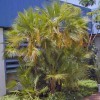Abstract
The paurotis or Everglades palm is a clustering, fan-leaved palm with very slender stems. It can reach heights up to 30 feet, with a spread of 20 feet. The light green leaves have blades about 2 feet across on spiny petioles up to 3 feet long. The stems are covered with fibers and persistent leaf bases. In the spring paurotis palms produce large inflorescences of creamy white flowers that extend well beyond the foliage. These are followed in the summer by ¼-inch round fruits that pass through green and orange stages but turn black when completely ripe. Paurotis palms are rather slow-growing and are not tolerant of salt spray. This 3-page fact sheet was written by Timothy K. Broschat, and published by the UF Department of Environmental Horticulture, September 2014.
ENH-217/ST058: Acoelorrhaphe wrightii: Paurotis Palm (ufl.edu)
References
Broschat, T. K. 1990. "Potassium deficiency of palms in south Florida." Principes 34:151-155.
Elliott, M. L., T. K. Broschat, J. Y. Uchida, and G. W. Simone. 2004. Compendium of diseases and disorders of ornamental palms. St. Paul, MN. American Phytopathological Society Press. https://doi.org/10.1094/APSnetFeature-2004-0304
Meerow, A. W. 2006. Betrock's landscape palms. Hollywood, FL: Betrock Information Systems.

